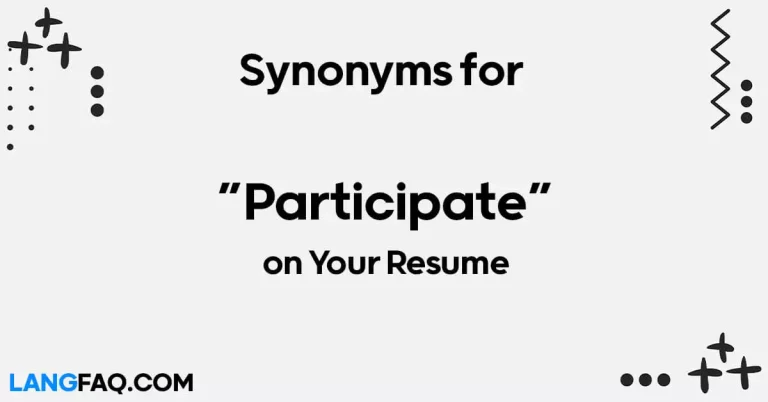In the realm of communication, conveying assurance and support is paramount. The phrase “We’ve Got You Covered” is a staple, but diversity in expression enhances communication. In this comprehensive guide, we explore 12 alternative ways to convey the same message, offering a rich vocabulary for various contexts. Let’s dive into the nuances of language and discover powerful ways to express assurance.
12 Other Ways to Say “We’ve Got You Covered”
Here are 12 alternative ways to say “We’ve Got You Covered”:
- You’re in Safe Hands
- We’ve Taken Care of Everything
- You Can Rely on Us
- Consider It Done
- Count on Our Support
- We Have You Protected
- Rest Easy, We’re Here for You
- Your Concerns Are Our Priority
- We’ve Got Your Back
- You’re in Good Company
- We’ll Handle It for You
- Your Needs Are Covered
Here’s a table with the meaning and examples for each alternative way to say “We’ve Got You Covered”:
| Expression | Meaning | Examples |
|---|---|---|
| You’re in Safe Hands | Assurance of safety and reliability | “With our experienced team, you’re in safe hands.” |
| We’ve Taken Care of Everything | Assurance of thorough attention | “Sit back; we’ve taken care of everything for you.” |
| You Can Rely on Us | Emphasis on trust and dependability | “You can always rely on us to meet your needs.” |
| Consider It Done | Assurance of prompt completion | “Your request is noted; consider it done.” |
| Count on Our Support | Highlighting reliable assistance | “In challenging times, count on our support.” |
| We Have You Protected | Emphasis on ensuring safety | “Your privacy is vital; we have you protected.” |
| Rest Easy, We’re Here for You | Reassurance with a comforting tone | “Rest easy; we’re here for you, no matter what.” |
| Your Concerns Are Our Priority | Prioritizing customer needs | “Your concerns are our priority; we’ll address them.” |
| We’ve Got Your Back | Conveying support and solidarity | “In times of trouble, know that we’ve got your back.” |
| You’re in Good Company | Assuring a positive affiliation | “Join us, and you’re in good company.” |
| We’ll Handle It for You | Taking responsibility for tasks | “Leave it to us; we’ll handle it for you.” |
| Your Needs Are Covered | Assurance of comprehensive support | “From A to Z, your needs are covered with us.” |
This table provides a diverse array of expressions to convey the reassuring message “We’ve Got You Covered.” Whether emphasizing safety, dependability, or comprehensive support, these alternatives offer a nuanced approach to assure others.
Tailoring your language to the specific context can enhance communication and foster a sense of trust and reliability. So, go ahead and choose the phrase that resonates best with your intent, creating a positive and impactful connection with your audience.
Is It Correct to Say “We’ve Got You Covered”?
Yes, the phrase “We’ve Got You Covered” is correct and widely used in English. This expression is often employed to convey assurance, support, or a commitment to taking care of someone’s needs or concerns. It’s a versatile and informal way of letting others know that they can rely on you or your services in various situations.
Definition and Usage:
- Definition: Assuring someone that their needs, concerns, or responsibilities are well taken care of.
- Usage: Appropriate in both formal and informal contexts, depending on the nature of the assurance being provided.
Examples:
- Professional Context:
- Business Manager: “Need assistance with the upcoming project? Don’t worry; we’ve got you covered. Our team is well-prepared to handle every aspect.”
- Casual Context:
- Friend Offering Help: “Moving to a new place? Let me know if you need help with anything. I’ve got you covered!”
Dictionary Insight:
Cambridge Dictionary defines “have someone covered” as to have done everything necessary to prepare for a particular situation.
Tips:
- Use this phrase when you want to convey a sense of assurance or support.
- It’s effective in both professional and personal settings.
- Ensure that the context fits the level of formality you intend to convey.
Professional Mail Example With “We’ve Got You Covered”
Subject: Comprehensive Support for Your Upcoming Project
Dear [Recipient’s Name],
I trust this message finds you well. As we gear up for the commencement of the upcoming project, I want to assure you that our team is fully prepared, and we’ve got you covered every step of the way.
We understand the significance of this project and the potential challenges it may pose. Rest assured, our dedicated team has meticulously planned for every contingency. From resource allocation to risk mitigation strategies, we’ve got you covered to ensure the smooth execution and success of the project.
Should you have any specific concerns or requirements, feel free to reach out at any time. Our commitment to your satisfaction and the project’s success is unwavering.
Looking forward to a successful collaboration.
Best regards,
[Your Full Name] [Your Position] [Your Company] [Contact Information]
You’re in Safe Hands: Navigating Assurance and Reliability
When it comes to emphasizing safety and reliability, the phrase “You’re in Safe Hands” is a powerful choice. Whether you’re assuring a client, a friend, or a family member, this expression conveys a sense of trust and dependability.
Definition and Usage:
- Definition: Assuring someone of their safety or reliability of a service.
- Usage: Appropriate in both formal and informal contexts.
Scenario:
Imagine you’re a project manager addressing concerns about a new initiative:
“Thank you for your concerns about the upcoming project. I want to assure everyone that our experienced team is handling it with the utmost care. You’re in safe hands.”
Example Sentence:
“Flying for the first time? Don’t worry; with our skilled pilots, you’re in safe hands.”
Email Sample:
Subject: Your Upcoming Project – Assurance of a Smooth Journey
Dear [Recipient],
I understand that embarking on a new project can be daunting. I want to reassure you that our team is well-equipped and experienced to navigate this journey. Your concerns are valid, and I want to emphasize that you’re in safe hands.
Best regards,
[Your Name]
Variations:
- For Colleagues: “Rest assured, your contributions are valued, and you’re in safe hands with this team.”
- For Friends: “Planning a road trip? I’ve got the directions covered. You’re in safe hands with me as your navigator.”
Pros and Cons:
Pros: Instills confidence, versatile in various contexts. Cons: May sound cliché if overused; effectiveness depends on genuine assurance.
Dictionary Insight:
Cambridge Dictionary defines being “in safe hands” as being cared for or dealt with by someone who is capable.
Tips:
Ensure sincerity when using this expression. Pair it with specific actions or plans to reinforce the sense of safety.
We’ve Taken Care of Everything: Emphasizing Thorough Attention
In situations demanding a comprehensive approach, the expression “We’ve Taken Care of Everything” communicates a thorough commitment to addressing concerns.
Definition and Usage:
- Definition: Assuring that every detail has been considered and managed.
- Usage: Suitable for formal communication or when meticulous attention is required.
Scenario:
A hotel manager assuring a guest about their stay:
“Thank you for choosing our hotel. Rest assured, we’ve taken care of everything to make your stay comfortable. From room amenities to dining options, everything is meticulously managed.”
Example Sentence:
“Hosting an event? Let us handle the logistics; we’ve taken care of everything.”
Email Sample:
Subject: Your Upcoming Event – Assurance of a Seamless Experience
Dear [Recipient],
As the event date approaches, I want to assure you that we’ve taken care of every detail. From catering to logistics, we’ve meticulously planned to ensure a seamless experience for you and your guests.
Best regards,
[Your Name]
Variations:
- For Colleagues: “Before the presentation, don’t worry; I’ve taken care of everything. Just focus on delivering your key points.”
- For Friends: “Planning a surprise party? I’ve taken care of everything. Just show up and enjoy!”
Pros and Cons:
Pros: Projects thoroughness and professionalism. Cons: May not be suitable for casual or spontaneous situations.
Dictionary Insight:
Cambridge Dictionary defines “taking care of” as dealing with something thoroughly and effectively.
Tips:
Use this expression when you want to convey a sense of assurance in situations requiring meticulous planning and execution.
You Can Rely on Us: Building Trust and Dependability
In the realm of trust and dependability, the phrase “You Can Rely on Us” stands as a solid commitment, assuring others that they can trust in the support or services being offered.
Definition and Usage:
- Definition: A firm commitment to being dependable and trustworthy.
- Usage: Appropriate in professional settings and personal relationships.
Scenario:
A service provider assuring a client about consistent support:
“Thank you for choosing our services. We want you to know that you can rely on us for consistent and reliable support. Your satisfaction is our priority.”
Example Sentence:
“Facing a challenge at work? You can rely on us to provide the necessary assistance.”
Email Sample:
Subject: Assurance of Dependability – Your Recent Service Request
Dear [Recipient],
We appreciate your recent service request. We want to assure you that you can rely on us to address it promptly and efficiently. Your satisfaction is our commitment.
Best regards,
[Your Name]
Variations:
- For Colleagues: “In this team, you can rely on us to meet deadlines and collaborate effectively.”
- For Friends: “Need a helping hand? You can rely on me anytime; I’ve got your back.”
Pros and Cons:
Pros: Establishes trust, suitable for various relationships. Cons: May sound formal; choose appropriate contexts for effectiveness.
Dictionary Insight:
The Cambridge Dictionary defines “rely on” as to trust or depend on someone or something.
Tips:
Use this expression to assure others of your commitment to being a dependable and trustworthy individual or service provider.
Consider It Done: Assuring Prompt Completion
In situations where prompt action is key, the expression “Consider It Done” signifies a commitment to swiftly addressing tasks or requests.
Definition and Usage:
- Definition: An assurance of prompt completion of a task or request.
- Usage: Suitable for both formal and informal contexts, especially in professional settings.
Scenario:
A manager responding to an urgent task assignment:
“I appreciate the urgency of this task. Consider it done; I will ensure it is completed by the end of the day.”
Example Sentence:
“Need these documents filed by noon? Consider it done; I’ll take care of it right away.”
Email Sample:
Subject: Task Completion – Consider It Done
Dear [Recipient],
Thank you for entrusting me with the task. I want to assure you that it’s a priority, and you can consider it done by the specified deadline.
Best regards,
[Your Name]
Variations:
- For Colleagues: “Need assistance with the presentation? Consider it done; I’ll have the slides ready for you.”
- For Friends: “Planning a surprise party? Consider it done; I’ll handle the decorations and invites.”
Pros and Cons:
Pros: Communicates efficiency and reliability. Cons: May not be suitable for complex or time-consuming tasks.
Dictionary Insight:
Cambridge Dictionary defines “consider it done” as a way of agreeing to do something immediately.
Tips:
Use this expression when you want to convey a sense of urgency and efficiency in task completion. Ensure that you can deliver on the promise promptly.
Count on Our Support: Highlighting Reliable Assistance
When emphasizing a commitment to providing reliable assistance, the phrase “Count on Our Support” communicates a sense of dependability, assuring others that help is readily available.
Definition and Usage:
- Definition: A commitment to being a reliable source of assistance.
- Usage: Suitable for professional and personal assurances of support.
Scenario:
A customer service representative addressing a client’s concerns:
“We understand your frustration, and we want you to know that you can count on our support to resolve this matter. Your satisfaction is our priority.”
Example Sentence:
“Starting a new project? Count on our support; we’re here to help you every step of the way.”
Email Sample:
Subject: Your Concerns Matter – Count on Our Support
Dear [Recipient],
Thank you for reaching out with your concerns. I want to assure you that you can count on our support to address and resolve the issues you’ve raised. Your satisfaction is crucial to us.
Best regards,
[Your Name]
Variations:
- For Colleagues: “Facing a challenging task? Count on our support; we’re here to collaborate and ensure success.”
- For Friends: “Dealing with a tough situation? Count on my support; we’ll get through it together.”
Pros and Cons:
Pros: Establishes a sense of reliability and willingness to assist. Cons: May sound formal; choose appropriate contexts for effectiveness.
Dictionary Insight:
Cambridge Dictionary defines “count on” as to be able to trust someone or something to do what you expect or need.
Tips:
Use this expression to convey a consistent and dependable source of support. Ensure that you follow through on your commitment to assistance.
We Have You Protected: Conveying a Sense of Safety
In situations where safety is a primary concern, the phrase “We Have You Protected” assures others that measures are in place to ensure their well-being.
Definition and Usage:
- Definition: Assuring someone of safety or protection.
- Usage: Appropriate in contexts where safety is a priority, both formal and informal.
Scenario:
A cybersecurity expert explaining protective measures to a client:
“In the digital age, ensuring your data’s safety is paramount. With our advanced security protocols, rest easy; we have you protected.”
Example Sentence:
“Embarking on a challenging journey? With our guidance and precautions, we have you protected throughout.”
Email Sample:
Subject: Security Measures – We Have You Protected
Dear [Recipient],
In light of recent security concerns, I want to assure you that we have implemented additional measures to ensure your safety. Rest easy; we have you protected.
Best regards,
[Your Name]
Variations:
- For Colleagues: “In this team, we have each other protected; our collective efforts ensure a secure work environment.”
- For Friends: “Heading into an unfamiliar neighborhood? Don’t worry; with me by your side, we have each other protected.”
Pros and Cons:
Pros: Instills a sense of security and protection. Cons: May be overly formal for casual situations.
Dictionary Insight:
Cambridge Dictionary defines “protected” as kept safe from harm or damage.
Tips:
Use this expression when emphasizing safety measures or protective actions. Ensure clarity on the specific protections in place.
Rest Easy, We’re Here for You: Conveying Comfort and Assurance
In moments where comfort and assurance are paramount, the phrase “Rest Easy, We’re Here for You” offers solace and support, assuring others that assistance is readily available.
Definition and Usage:
- Definition: Providing comfort and assurance in challenging or uncertain situations.
- Usage: Suitable for both formal and informal contexts, especially when offering emotional support.
Scenario:
A friend comforting someone going through a tough time:
“I know things are difficult right now, but rest easy. We’re here for you, ready to lend an ear or a helping hand whenever you need.”
Example Sentence:
“Facing a personal crisis? Rest easy; we’re here for you, supporting you through thick and thin.”
Email Sample:
Subject: Your Well-being Matters – Rest Easy
Dear [Recipient],
Life can throw unexpected challenges our way. I want to remind you to rest easy, knowing that we’re here for you. If you ever need someone to talk to or support in any form, don’t hesitate to reach out.
Take care,
[Your Name]
Variations:
- For Colleagues: “Working on a high-pressure project? Rest easy; we’re here for each other, collaborating to achieve success.”
- For Family: “Navigating a family crisis? Rest easy; as a family, we’re here for each other, providing unwavering support.”
Pros and Cons:
Pros: Offers emotional support, creates a sense of solidarity. Cons: May be perceived as informal in strictly professional settings.
Dictionary Insight:
Cambridge Dictionary defines “rest easy” as to stop worrying.
Tips:
Use this expression when you want to offer emotional support and assure others that they can rely on you during challenging times.
Your Concerns Are Our Priority: Prioritizing Customer Needs
For businesses and service providers, emphasizing that “Your Concerns Are Our Priority” communicates a commitment to addressing customer needs promptly and effectively.
Definition and Usage:
- Definition: Expressing a commitment to prioritize and address customer concerns.
- Usage: Suitable for formal communication, especially in customer service interactions.
Scenario:
A customer service representative responding to a client complaint:
“We appreciate you bringing this matter to our attention. I want to assure you that your concerns are our priority, and we are actively working to resolve the issue to your satisfaction.”
Example Sentence:
“Shopping with us? Your concerns are our priority, and our customer service team is here to assist you at any point during your journey.”
Email Sample:
Subject: Your Feedback Matters – Your Concerns Are Our Priority
Dear [Recipient],
Thank you for sharing your feedback with us. I want to assure you that your concerns are our priority. We are committed to addressing them promptly and ensuring your satisfaction.
Best regards,
[Your Name]
Variations:
- For Colleagues: “Working on a project together? Your concerns are our priority; let’s collaborate to address any challenges that arise.”
- For Friends: “Planning an event? Your concerns are our priority; let’s work together to make it a success.”
Pros and Cons:
Pros: Demonstrates customer-centricity, enhances brand trust. Cons: May sound formal; choose appropriate contexts for effectiveness.
Dictionary Insight:
Cambridge Dictionary defines “priority” as the state of being regarded as more important than something else.
Tips:
Use this expression in customer service interactions to convey a commitment to addressing concerns promptly and prioritizing customer satisfaction.
We’ve Got Your Back: Conveying Support and Solidarity
In situations requiring solidarity and support, the timeless phrase “We’ve Got Your Back” fosters a sense of camaraderie and assurance, assuring others that they are not alone.
Definition and Usage:
- Definition: Expressing unwavering support and loyalty.
- Usage: Suitable for various contexts, both formal and informal, where support is crucial.
Scenario:
A team leader addressing the concerns of a team member:
“I understand that this project is challenging, but remember, we’ve got your back. Your success is our success, and we’re here to support you every step of the way.”
Example Sentence:
“Facing a personal crisis? Don’t worry; we’ve got your back. Lean on us for support and guidance.”
Email Sample:
Subject: Team Support – We’ve Got Your Back
Dear [Team Member],
I know the upcoming project is demanding, but I want to reassure you that as a team, we’ve got your back. Your success is our collective goal, and we’ll support you throughout the entire process.
Best regards,
[Your Name]
Variations:
- For Colleagues: “Presenting in a meeting? We’ve got your back; count on our support for a successful presentation.”
- For Friends: “Going through a tough time? Remember, we’ve got your back; you’re not alone in this journey.”
Pros and Cons:
Pros: Fosters a sense of camaraderie and teamwork. Cons: May sound informal in strictly professional contexts.
Dictionary Insight:
Cambridge Dictionary defines “have someone’s back” as to be ready to help or defend someone.
Tips:
Use this expression to create a sense of unity and support within a team or group. Ensure that the commitment to support is genuine and actionable.
In Our Care, Your Peace of Mind: Nurturing Tone for Support
When conveying a nurturing and comforting tone, the expression “In Our Care, Your Peace of Mind” communicates a sense of guardianship and overall well-being.
Definition and Usage:
- Definition: Assuring others of being under protection and guidance for their well-being.
- Usage: Suitable for formal contexts, especially in healthcare or service industries.
Scenario:
A healthcare professional reassuring a patient:
“As you undergo this treatment, remember that you’re in our care. Your well-being is our top priority, and we’re here to provide support and ensure your peace of mind throughout the process.”
Example Sentence:
“Choosing our childcare services? Your child is in our care, and their safety and happiness are our primary concerns.”
Email Sample:
Subject: Your Well-being Matters – In Our Care
Dear [Recipient],
Thank you for choosing our services. I want to assure you that in our care, your peace of mind is our priority. We are committed to providing the support and attention you need.
Best regards,
[Your Name]
Variations:
- For Colleagues: “Starting a new project? In our care, your success is our focus; let’s collaborate for a smooth process.”
- For Friends: “Planning an event together? In our care, every detail matters, and we’ll ensure it’s a success.”
Pros and Cons:
Pros: Creates a sense of trust and comfort. Cons: May sound overly formal in casual contexts.
Dictionary Insight:
Cambridge Dictionary defines “in someone’s care” as being looked after or protected by someone.
Tips:
Use this expression when you want to convey a nurturing and protective tone, particularly in contexts related to well-being or care services. Ensure that the commitment to care is genuine and comprehensive.
Assured Protection: Emphasizing Security Measures
When dealing with protective measures, the phrase “Assured Protection” signifies a commitment to safeguarding and ensuring the well-being of individuals or entities.
Definition and Usage:
- Definition: Offering a guarantee of security and protection.
- Usage: Suitable for formal contexts, especially in security-related industries.
Scenario:
A cybersecurity company highlighting their services:
“In the digital landscape, your data’s security is non-negotiable. Our advanced systems provide assured protection, ensuring a secure environment for your sensitive information.”
Example Sentence:
“Exploring our insurance plans? Rest easy; our policies come with assured protection for your valuable assets.”
Email Sample:
Subject: Security Assurance – Assured Protection for Your Data
Dear [Recipient],
Thank you for considering our services. I want to assure you that our systems are designed to provide assured protection for your data. Your security is our top priority.
Best regards,
[Your Name]
Variations:
- For Colleagues: “Launching a new product? Assured protection is crucial; let’s ensure the quality and safety of our offerings.”
- For Friends: “Planning a trip together? Assured protection; we’ll take necessary precautions for a safe and enjoyable journey.”
Pros and Cons:
Pros: Establishes a sense of reliability and commitment to security. Cons: May sound formal; choose appropriate contexts for effectiveness.
Dictionary Insight:
Cambridge Dictionary defines “assured” as guaranteed or made certain.
Tips:
Use this expression when emphasizing the reliability and certainty of protective measures. Ensure that the security measures are well-defined and thoroughly communicated.
Always at Your Service: Perpetual Readiness for Assistance
Highlighting perpetual readiness, the expression “Always at Your Service” assures others that assistance is not only available but a constant commitment.
Definition and Usage:
- Definition: Conveying a continuous commitment to providing assistance.
- Usage: Suitable for formal and professional contexts, emphasizing ongoing support.
Scenario:
A customer service representative addressing a client’s inquiry:
“Thank you for reaching out. I want to assure you that we are always at your service. Feel free to contact us anytime for assistance; your satisfaction is our priority.”
Example Sentence:
“Dealing with technical issues? Don’t hesitate to reach out; we’re always at your service to provide technical support.”
Email Sample:
Subject: Always Ready to Assist – Your Inquiry Matters
Dear [Recipient],
We appreciate your inquiry. I want to assure you that we are always at your service. Should you have any questions or concerns, feel free to reach out, and we’ll be happy to assist.
Best regards,
[Your Name]
Variations:
- For Colleagues: “Navigating a challenging project? We’re always at each other’s service, collaborating for success.”
- For Friends: “Planning an event? Count on us; we’re always at your service to ensure it’s a memorable occasion.”
Pros and Cons:
Pros: Conveys perpetual readiness and commitment to assistance. Cons: May sound overly formal in casual contexts.
Dictionary Insight:
Cambridge Dictionary defines “at someone’s service” as ready to help or do what someone asks.
Tips:
Use this expression when you want to convey a continuous commitment to providing assistance. Ensure that the promise of perpetual readiness is genuine and achievable.
FAQs
How can I effectively communicate assurance?
Effective communication of assurance involves choosing expressions that align with the context. “Your Safety, Our Priority” and “Rest Assured with Us in Your Corner” convey assurance with a touch of personal commitment.
Are these alternatives suitable for professional use?
Absolutely. Expressions like “Counting on Us for Your Needs” and “Guaranteed Assistance at Every Step” carry a professional tone, instilling confidence in clients.
Can these phrases be used interchangeably?
While each phrase carries its own nuance, many can be used interchangeably based on the level of formality and context. Experiment to find the best fit.
Is “We’ve Got It Covered” too similar to the original phrase?
“We’ve Got It Covered” maintains familiarity while allowing for a broader application. It’s a versatile choice suitable for various situations.
How can businesses benefit from using these expressions?
Businesses can enhance their communication by choosing phrases that resonate with their values. Expressions like “Your Reassurance Starts Here” create a positive association.
Can I use these expressions in written communication?
Absolutely. These expressions are versatile and can be seamlessly integrated into written communication, adding depth to your message.
Conclusion
Communication is a powerful tool, and the way we convey assurance plays a crucial role. By embracing these 12 alternative expressions, you not only diversify your vocabulary but also enhance the impact of your message. Remember, effective communication is not just about what you say but how you say it.







